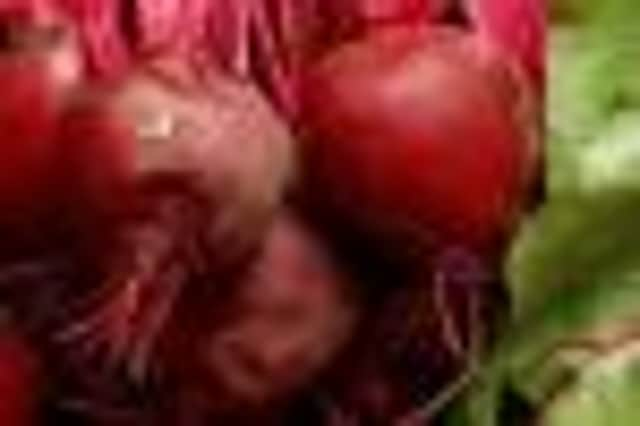Daily beetroot portion helps lower blood pressure


Researchers discovered people with high blood pressure who drank about eight ounces of beetroot juice experienced a decrease in blood pressure.
Beetroot is rich in nitrate and is known to widen blood vessels, helping the flow of blood around the body.
Advertisement
Hide AdAdvertisement
Hide AdYet researchers from the Barts and the London Medical School were surprised how little nitrate was needed to have a positive effect.
Other nitrate-rich vegetables are also important in combating high blood pressure but getting people to eat more fruit and vegetables is a challenge.
Professor of vascular pharmacology Amrita Ahluwalia said: “In the UK the general public is told that they should be eating five portions of fruit or vegetables a day but this can be hard to do.
“Perhaps we should have a different approach to dietary advice. If one could eat just one fruit or vegetable a day, this is one more than nothing and should be viewed as positive.
“Our hope is that increasing one’s intake of vegetables with a high dietary nitrate content, such as green leafy vegetables or beetroot, might be a lifestyle approach that one could easily employ to improve cardio-vascular health.”
Professor Peter Weissberg, medical director at the British Heart Foundation, added: “This promising study shows that it may be possible to reduce high blood pressure by eating more foods that contain large quantities of nitrates, such as green vegetables and beetroot.
“It supports current advice that we should all be eating plenty of green veg.
“But we need larger studies in patients to determine if nitrate-rich vegetables are effective at lowering blood pressure over the long term.”
Advertisement
Hide AdAdvertisement
Hide AdThe beetroot juice contained about 0.2g of dietary nitrate, levels one might find in a large bowl of lettuce or perhaps two beetroots.
In the body, the nitrate is converted to a chemical called nitrite and then to nitric oxide in the blood.
Nitric oxide is a gas that widens blood vessels and aids blood flow.
Professor Ahluwalia said: “We were surprised by how little nitrate was needed to see such a large effect.
“This study shows that compared to individuals with healthy blood pressure, much less nitrate is needed to produce the kinds of decreases in blood pressure that might provide clinical benefits in people who need to lower their blood pressure.
“However, we are still uncertain as to whether this effect is maintained in the long term,” she added.
The study was published in the American Heart Association journal Hypertension.